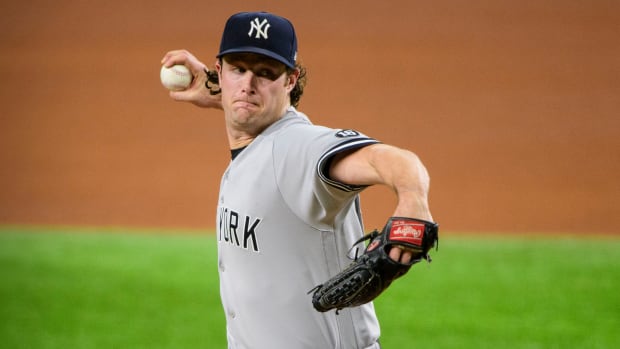Don’t let the names of Gerrit Cole and Trevor Bauer fool you. MLB’s latest scandal extends far beyond them.
Welcome to The Opener, where every weekday morning you’ll get a fresh, topical column to start your day from one of SI.com’s MLB writers.
The richest pitcher of all time faced perhaps the most challenging opponent of his career—the New York media—on Tuesday. “Have you ever used Spider Tack while pitching?” the New York Post’s Ken Davidoff asked the Yankees’ Gerrit Cole. Or, in other words: Have you ever cheated?
Cole paused. “Um, I don't—I don't know,” he said. “I don't know. It's—I don't know quite—I don't quite know how to answer that, to be honest.”
It was a fair question. It was also a fair response. But a better one might have been: “Yes. And so has just about everyone else, because the league and the teams tolerate and in some cases encourage it.”
Cole spent his entire press conference weathering questions about whether he is cheating, as did the Dodgers’ Trevor Bauer on Sunday. They are two of the most prominent figures in the reckoning that is sweeping Major League Baseball, as the sport attempts to crack down on rampant pitch-doctoring, which is helping to suppress offense and make the sport at times unwatchable. These pitchers’ hands have become the face of a scandal.

And yet this is not really about them specifically. Their success and their compensation have drawn attention from fans and other players alike, which is reasonable: With prominence comes scrutiny. (Cole, who finished second in American League Cy Young Award voting in 2019, is in the second year of a nine-year, $324 million deal, the largest ever for a pitcher; Bauer, who won the National League Cy Young Award in ’20, is in the first year of a three-year, $102 million deal.) But one recently retired player told Sports Illustrated that he believes between 80% and 90% of pitchers are applying some sort of foreign substance—what they call “sticky stuff”—to the baseball to make it harder to hit. So this scandal is not about individual actors. It’s about the system in which they operate.
Several of the pitchers who spoke to SI said their teams had encouraged them to use foreign substances to make their pitches spin faster. Some clubs make their preferred formula available to players. At least two have employed chemists, according to one pitcher.
They all described the feeling that they would be at a disadvantage if they did not use anything. One pitcher recalled a staffwide meeting in 2019 in which the pitching coach said, “A lot of people around the league are using sticky stuff to make their fastballs have more lift. And if you’re not using it, you should consider it, because you’re kind of behind.”
So was commissioner Rob Manfred. Just as MLB was slow to recognize the proliferation of steroids and the advancement of illegal sign-stealing, it allowed this latest scandal to unfold.
Manfred deserves some credit for acting now, in the middle of a season, as the situation becomes untenable. MLB has spent the first months of 2021 collecting baseballs and comparing players’ spin rates. At the owners’ meetings last week, the league presented evidence on the extent of the problem and agreed to proceed from analysis to enforcement. Umpires will be empowered to check pitchers frequently for illegal substances and to impose suspensions of 10 games.
Pitchers seem to have heard the league’s message. Four-seam fastballs, considered a bellwether pitch because their spin rate is hard to enhance without substances, are already spinning less fast. Cole’s season average before his last start was 2,561; on Thursday, after the enforcement plan leaked, it was 2,436. Bauer’s season average before his last start was 2,835; on Sunday, it was 2,612.
They both faced questions about those numbers. You know who did not? Yankees pitching coach Matt Blake and Dodgers pitching coach Mark Prior. (The teams did not return SI’s requests for interviews with them.) Manfred has not held a press conference on the topic.
Consider, too, who benefits from framing this as the players’ fault, and not the league’s. The collective bargaining agreement between the union and the owners expires in December. The sides often squabble through the press, both loudly and quietly.
The players have been cheating. But don’t let the names of individuals distract you from the name that really matters here: Manfred’s. That would be too much spin.
More MLB Coverage: